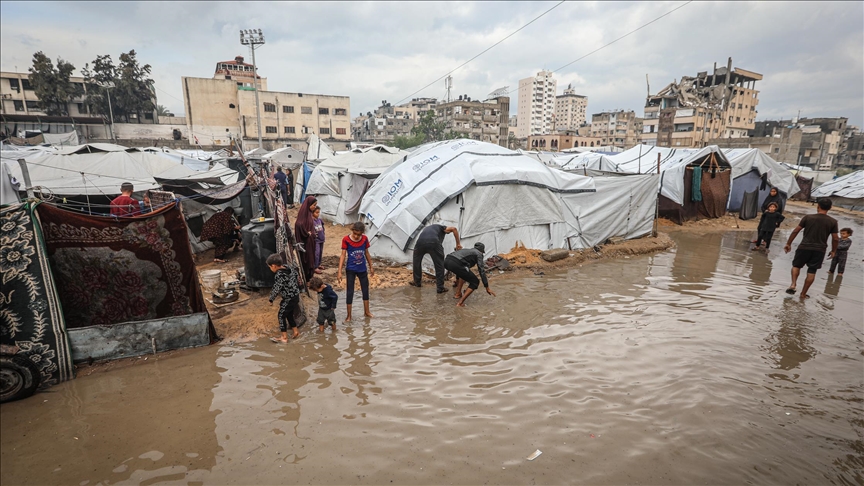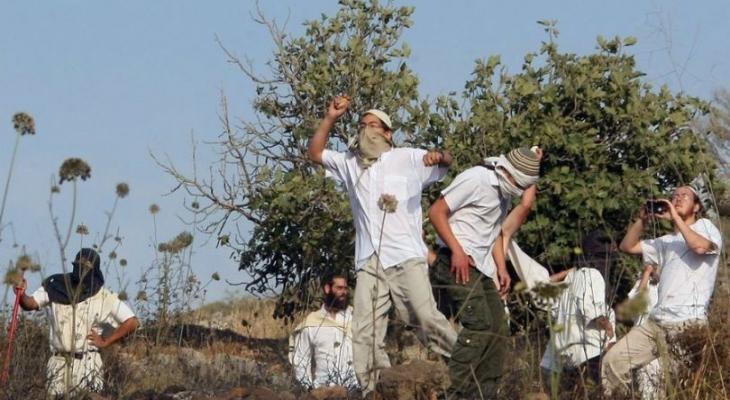RAMALLAH, February 19, 2025 (WAFA) - The Government Communication Center said the Government Operations Room for Emergency Interventions in the southern governorates (Gaza Strip) continues its efforts in coordination with national and international partners, with the support of the Council of Ministers, as part of the Emergency Response Plan.
According to a report issued by the Government Communication Center, the latest interventions from January 19, 2025, to February 17, 2025, have included the provision of shelter for displaced persons, rubble removal and road clearance, humanitarian aid and the delivery of essential health services, education, water and agricultural support.
Eight Displacement Centers Established and 19,000 Tents Provided in One Month
To identify the most suitable sites to shelter displaced persons, the Shelter Committee—established under the Government Operations Room—conducted assessments at 186 potential shelter sites, evaluating key criteria such as location, available space, land ownership, and accessibility to essential services. The collected data was entered into the Gemology integrated spatial information system, with comprehensive files prepared for each site and coordinates shared with partners to serve as a reference for humanitarian organizations.
As a result, seven existing shelters, managed by the Palestinian Red Crescent Society (PRCS) and housing hundreds of tents, were provided with water services, mobile sanitation units (portable toilets), solar power units, and water tanks. Additionally, the first new shelter center was established in Beit Lahia, covering 13 dunums and comprising 215 tents, in partnership with the United Nations Development Program (UNDP).
Work is also underway to finalize assessments for eight additional proposed shelter sites. Meanwhile, 19,000 tents have been provided, and as part of the “Urgent Appeal,” 1,400 requests for tents have been received, of which 980 have been fulfilled, with efforts ongoing to address the remaining cases. Coordination has also begun with the United Nations Mine Action Service (UNMAS) to conduct field surveys in Al-Mughraqa, Al-Zahraa, and Wadi Gaza, ensuring these areas are free of unexploded ordnance. Additionally, preparations are underway to develop a Shelter Site Management Guide in coordination with partners.
66,000 Tons of Rubble Cleared and Major Roads Reopened
The Ministry of Public Works and Housing, through the Government Operations Room, continues its efforts to clear rubble and reopen roads. In partnership with the Arab and International Organization to Construct in Palestine (AIOCP), 40,000 tons of debris have been removed—20,000 tons in Gaza City and 20,000 tons in Beit Lahia–Jabalia. Meanwhile, in collaboration with UNDP, more roads have been reopened and an additional 26,000 tons of rubble have been managed, with 290 tons repurposed for road restoration.
Despite these efforts, the volume of debris removed remains below the target due to limited resources and equipment. Intense coordination is ongoing with UNDP and AIOCP to enhance capacity in this area.
Millions of Relief Packages and Hundreds of Thousands of Meals Distributed Daily
Since the ceasefire, the Ministries of Social Development and Relief, along with partner organizations, have distributed food parcels to over 1.5 million people. Additionally, 780,000 cooked meals are provided daily, marking a 20% increase from the previous period.
Further, 114,500 food parcels and over 17,000 fresh produce packages have been delivered in partnership with local organizations. Ready-made meals, bread, and drinking water have been supplied to 101 displacement centers and schools in Gaza and northern areas.
To support displaced families, 74,000 hygiene kits, 77,000 mattresses and blankets, 27,000 clothing and footwear packages, and 42,000 covers have been distributed in collaboration with the Palestinian Red Crescent, the International Red Cross, and other partner organizations.
To enhance humanitarian aid distribution, a network of organizations is being established, with a focus on southern areas, while preparations are underway to expand operations to northern governorates. As part of food security efforts, the Ministry of Social Development signed an agreement with China to provide 20 million Yuan in aid, including large food shipments of rice, sugar, flour, milk, and cooking oil, to be delivered via the Jordan Hashemite Charity Organization to alleviate suffering among affected families.
Strengthening Healthcare Services and Medical Supply Delivery
The Palestinian Red Crescent Society (PRCS) has successfully relocated the Kuwaiti Red Crescent Field Hospital from Khan Younis to Gaza City, where it will be re-established in the Al-Saraya area as the first fully transferred field hospital. The facility includes surgical units, neonatal care, intensive care, radiology, emergency, and reception departments.
Meanwhile, the Iraqi humanitarian grant has been renewed, providing 10 million liters of fuel to sustain essential humanitarian operations in Gaza, in cooperation with the Iraqi, Egyptian, and Palestinian Red Crescent Societies.
In coordination with the World Health Organization (WHO), the Ministry of Health has delivered 68 pallets of medicines and medical supplies, including 50 pallets of essential medicines and fluids, 10 pallets of medical consumables, and 8 pallets of laboratory materials, with a total value exceeding 4 million shekels. These supplies address urgent healthcare needs in Gaza.
Over 100 Emergency Interventions to Restore Water and Sanitation Services
With funding from Arab Funds and contributions from the Arab and International Organizations to Construct in Palestine, over 100 emergency interventions have been carried out to rehabilitate water and sanitation infrastructure in collaboration with the Palestinian Water Authority and the Coastal Municipalities Water Utility.
Key projects included:
• Restoring the main water pipeline from Mekorot to the Bani Suhaila reservoir, by installing a new 1,600-meter pipeline, improving water access for 336,000 residents daily.
• Constructing a new 2,600-meter water pipeline in Al-Qarara to provide clean and sustainable water sources.
• Rehabilitating the Mekorot-Bani Said connection, which supplies 14,000 cubic meters of water daily to the central region.
• Expanding wastewater drainage networks, including the Sheikh Radwan Basin.
• The Ministry of Labor, through the Palestinian Employment Fund, is implementing the Early Recovery Project for the maintenance of water lines and infrastructure, supported by the Norwegian government and UNDP.
Education Services Enhanced and School Repairs Initiated
The Ministry of Education and Higher Education, in cooperation with UNICEF, has distributed 30,000 backpacks for female students (ages 12-18) and 6,000 storybooks for students in grades 1-12 in Khan Younis and central Gaza as part of educational initiatives.
Additionally, the Ministry has successfully completed the third round of the General Secondary Education Certificate Examination for students abroad. A preliminary assessment of school damages has also been completed, identifying schools in need of repairs and those requiring debris removal. The ministry is coordinating with the Ministry of Public Works and Housing to facilitate rubble removal and establish temporary schools in affected areas.
Emergency Support for Farmers and 2,500 Livestock Breeders
The Ministry of Agriculture has launched an emergency aid project for 180 farmers in Khan Younis and Central Gaza Governorate, in cooperation with Première Urgence Internationale and the Union of Agricultural Work Committees, providing essential agricultural inputs.
Additionally, 250 kg of concentrated animal feed and 50 kg of barley per beneficiary have been distributed as part of a project targeting 2,500 livestock breeders, implemented in collaboration with the Food and Agriculture Organization of the United Nations (FAO). This also includes the distribution of high-protein feed for sheep fattening to 210 sheep breeders, consisting of 1,050 bags of feed and 210 bags of barley. Furthermore, 4,000 fresh vegetable parcels were distributed to returnees, along with 2,200 "Dignity Bags" in Khan Younis, and 216 food parcels for families returning to Gaza. The General Union of Farmers also distributed 500 large food parcels to families in the eastern villages of Khan Younis, funded by the World Central Kitchen.
Launch of Temporary Employment Programs
The Ministry of Labor has begun securing hundreds of temporary job opportunities in the first phase in the Gaza Strip to assist field teams in addressing the emergency situations resulting from the consequences of the war on Gaza. Additionally, hundreds of temporary job opportunities (labor-intensive jobs in Gaza) are being provided as part of the efforts led by the "Government Operations Room for Emergency Interventions in Gaza."
Government Operations Room Activities to Support the Emergency Response Plan
The Government Operations Room continued to implement a series of activities to support the Emergency Response plan in Gaza. A monitoring framework to follow-up on the implementation of plan was developed in cooperation with (UNDP), where priorities for each ministry were identified and reviewed to ensure their feasibility over the next six months. Members were also tasked with preparing a detailed report on public employees in the Gaza Strip.
In the religious field, a documentary study of mosques and churches in the Gaza Strip was prepared. Cooperation also took place with the Housing, Land, and Property (HLP) Technical Working Group to assist government institutions in documenting personal documents and land ownership.
Furthermore, the Operations Room hosted a delegation from the Chinese Embassy to discuss support for the restoration of partially damaged homes and the provision of assistance in securing prefabricated housing units. Meetings were also held with private sector representatives to support their efforts in relief activities. Cooperation with the United Nations Mine Action Service (UNMAS) helped provide informative materials and assist in reporting suspicious objects.
Additionally, the Palestinian Employment Fund presented a proposal for "cash-for-work" programs, and meetings were held to assess damages, with the participation of UNDP and the Arab and International Organization to Construct in Palestine (AIOCP). The Operations Room also played a role in facilitating the licensing of ambulances and facilitating the entry of aid trucks through the Al-Ismailia border crossing.
T.R.












